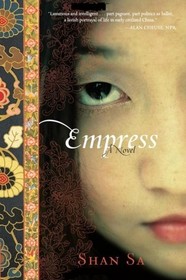Helpful Score: 2
Great historical fiction, the story of a very determined and strong
woman; the only female emperor-ess? Lots of country,customs and local color behind the "walls" of the forbidden city.
woman; the only female emperor-ess? Lots of country,customs and local color behind the "walls" of the forbidden city.
Helpful Score: 1
Great read awesome details very good read
Helpful Score: 1
I agree with Leah's review; there were not many opportunities to emotionally connect with the incredibly strong main character. She seemed to become much harder to identify with as the book went along, which I suppose makes sense as she goes from a young girl of a lower-noble family to empress of China, but this still makes the book more difficult to get through. A decent read, but I've read much better historical fiction.
I gave up on this book about half way through. It just did not engage me on any level. Bland writing style and plot line.
In beautiful proses, author Shan Sa details desciptions of imperial life, traditions, beliefs, fears and sexuality during the 7th century of China's history. It leads the reader through the rise of Empress Wu from the life of a commoner to Empress through clever manipulation of those around her. Time and again the empress demonstrated her merciless repression of family members to retain order in the empire as well as to retain her supreme status. This is a wonderful account of a memorable woman of ancient China.
This is a fantastic book! The author Shan Sa is intelligent and articulate. The novel which is based on historical fact, is written as poetry yet also very educational about this period in Chinese history.
This is a well written and very entertaining story. If you like historical fiction, you will love it!
I had great expectations when I began to read this book. I am a great fan of historical fiction and since I had enjoyed Lisa See's Snowflower and the Secret Fan, hoped for a deeper insight into the workings of Chinese feminine culture.
Unfortunately, I was disappointed. It is true that this book is historically quite accurate and does detail the life of this empress intricately. However, the author seemed to hesitate to ascribe motivations and/or emotions to her character. True, we can never really know how someone who lived in the past felt, or what they thought, but it seems to me that the whole point of writing historical fiction is that the author tries to inhabit the character whose life they have chosen. In fact, I read an article about biographers and their subjects which seemed to portray the relationship as a very intimate one. So I was disappointed when Shan Sa writes a sentence similar to, "My sister contracted a terrible female disease and wasted away, all the while blaming me for her death." As one sentence in a paragraph or two, or even a chapter about the sister's death, what her agony was like, how the Empress was implicated and how she felt about those implications and how they influenced those around her, it would be sufficient. But as the entire summation of the event, it leaves me cold. (NOTE: I just made up that sentence as an example of what some of the prose in the book is similar to - it is not an actual line from the book.)
Thus, I found the book disappointing. Due to my lack of emotional involvement in the book, I cannot even remember any historical details about it, except that there was a comet (or maybe two) during the reign of the Empress.
Unfortunately, I was disappointed. It is true that this book is historically quite accurate and does detail the life of this empress intricately. However, the author seemed to hesitate to ascribe motivations and/or emotions to her character. True, we can never really know how someone who lived in the past felt, or what they thought, but it seems to me that the whole point of writing historical fiction is that the author tries to inhabit the character whose life they have chosen. In fact, I read an article about biographers and their subjects which seemed to portray the relationship as a very intimate one. So I was disappointed when Shan Sa writes a sentence similar to, "My sister contracted a terrible female disease and wasted away, all the while blaming me for her death." As one sentence in a paragraph or two, or even a chapter about the sister's death, what her agony was like, how the Empress was implicated and how she felt about those implications and how they influenced those around her, it would be sufficient. But as the entire summation of the event, it leaves me cold. (NOTE: I just made up that sentence as an example of what some of the prose in the book is similar to - it is not an actual line from the book.)
Thus, I found the book disappointing. Due to my lack of emotional involvement in the book, I cannot even remember any historical details about it, except that there was a comet (or maybe two) during the reign of the Empress.




